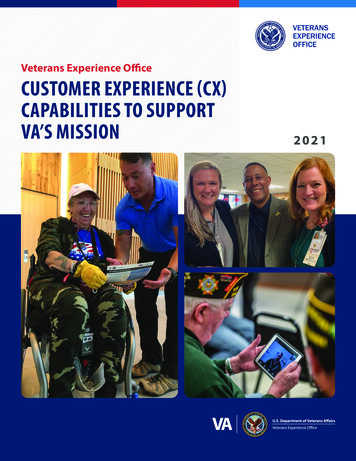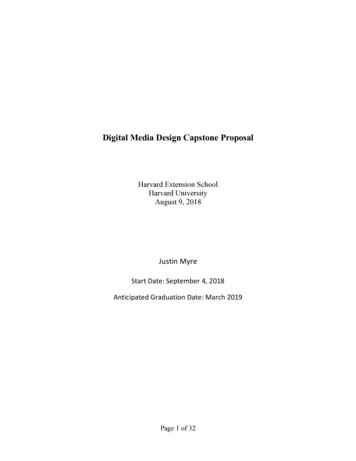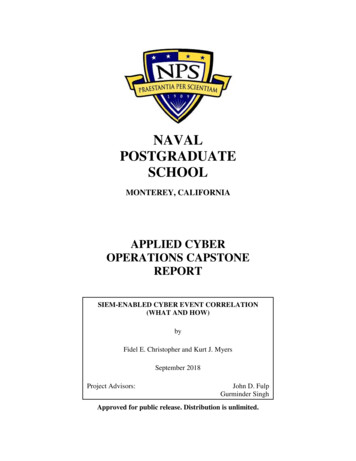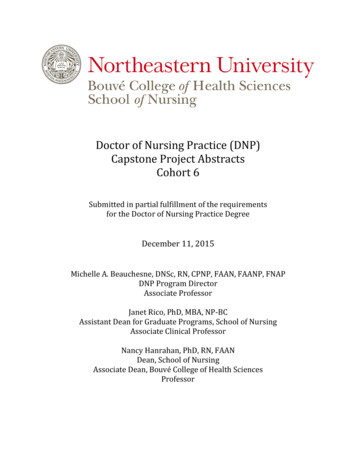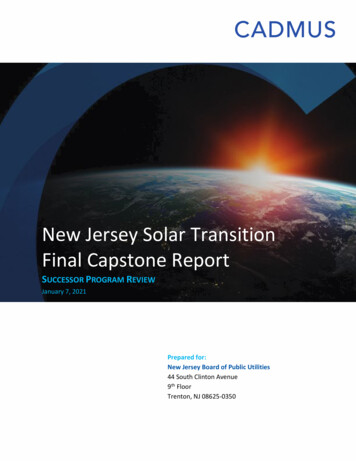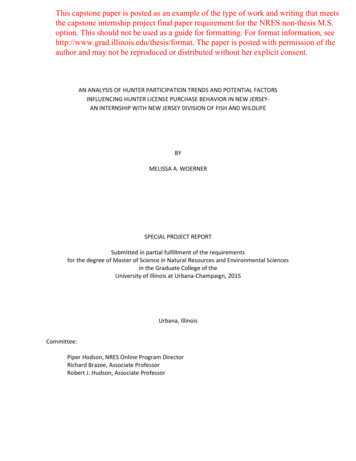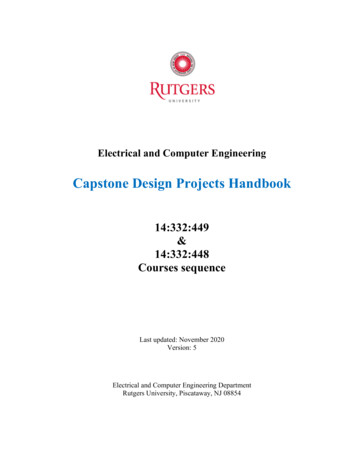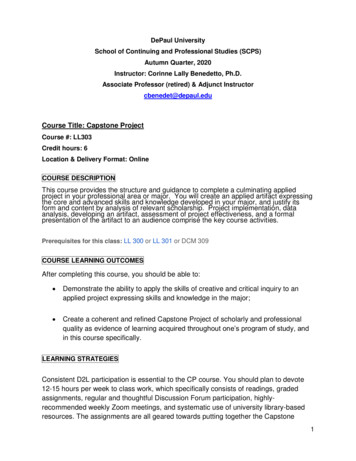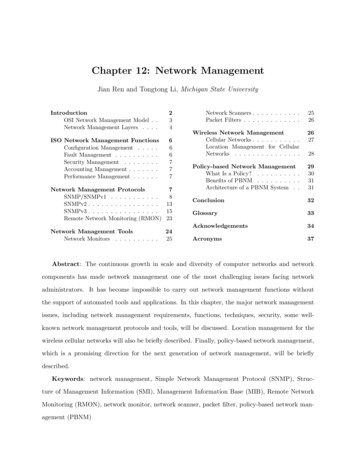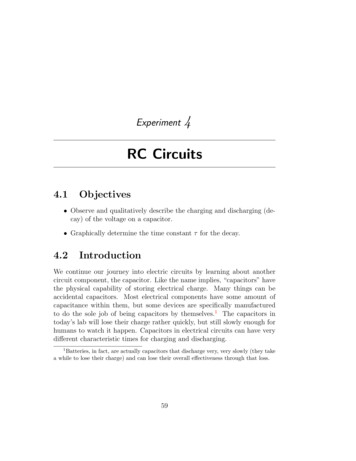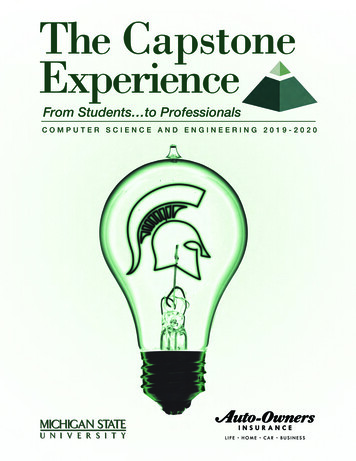
Transcription
The CapstoneExperienceFrom Students to ProfessionalsCOMPUTER SCIENCE AND ENGINEERING 2019-2020
The Capstone ExperienceDepartment of Computer Science and EngineeringCSE498, Collaborative DesignDr. Wayne DyksenProfessor of Computer Scienceand EngineeringThe Capstone Experience provides the educational capstone for all studentsmajoring in computer science at Michigan State University. Teams of studentsbuild software projects for corporate clients.During the Capstone Experience, students design, develop, debug, document,and deliver a software project for acorporate client, work in a team environment, develop written and oralcommunication skills, become proficient with softwaredevelopment tools and environments, and consider issues of professionalismand ethics.Corporate clients are local, regional, andnational including Accenture, Amazon,AppDynamics, Auto-Owners Insurance,Bosch, Dow Chemical, Evolutio, FordMotor Company, General Motors,Google, Herman Miller, Learning A-Z,Lockheed Martin Space, MaxCogito,Meijer, Michigan State University,Microsoft, Mozilla, MSU Federal CreditUnion, Place Technology, Principal,Proofpoint, Quicken Loans, TechnologyServices Group, TechSmith, UnionPacific Railroad, United Airlines, UrbanScience, Volkswagen and Whirlpool.
2019-2020Michigan State UniversityAt the end of eachsemester, the College ofEngineering sponsorsDesign Day, at whichstudent teams fromthroughout the Collegeshowcase their Capstoneprojects throughout theEngineering Building.Computer science capstone teamsdemonstrate the software projectsthat they have designed, developedand delivered for their corporateclient. Teams compete for fourawards, which are conferred by apanel of corporate judges.THANKS TO AUTO-OWNERS INSURANCEWe thank Auto-Owners Insurance, aFortune 500 company headquartered inLansing, Michigan, for their continuedsupport of Michigan State University and theCapstone Experience, including the printingof The Capstone Experience booklet.Check out the Capstone Experience web site atwww.capstone.cse.msu.edu. For more information about thecapstone experience or becoming a capstone project sponsor,contact Dr. Wayne Dyksen by email (dyksen@msu.edu) orby phone (517-353-5573).PAGE 1
The Capstone ExperienceCapstone Project Sponsors Fall 2019Chicago, Illinois & Washington, D.C.Seattle, Washington & Detroit, Michigan San Jose, California & Southfield, MichiganLansing, MichiganPlymouth, MichiganMidland, MichiganIndianapolis, IndianaDearborn, MichiganDetroit, MichiganCambridge, MassachusettsZeeland, MichiganAnn Arbor, MichiganGrand Rapids, Michigan Grand Rapids, Michigan Redmond, WashingtonEast Lansing, MichiganSunnyvale, CaliforniaOmaha, Nebraska & Okemos, MichiganMountain View, CaliforniaChicago, IllinoisChicago, IllinoisRoyal Oak, Michigan Auburn Hills, MichiganPAGE 2East Lansing, MichiganOkemos, MichiganDetroit, MichiganChicago, Illinois
Computer Science and EngineeringAccentureEmail Classification Using Machine LearningAccenture is a Fortune Global 500 company that solves theirclients’ toughest challenges by providing services in strategy,consulting, digital, technology and operations. Accenture’siDefense provides contextual, timely and actionable security intelligenceto the largest governments and organizations in the world, enablingthem to make smarter decisions to defend against new and evolvingthreats.Spam emails are a growing issue for many companies. Accordingto SpamHaus, 14.5 billion spam emails are sent globally every day,accounting for nearly 45% of all emails sent. Spam emails can rangefrom mild annoyance to exceedingly dangerous, possibly containingpotent computer viruses and malware.Due to the increased sophistication of spam emails, it is becomingmore and more challenging for companies and employees to determinethe legitimacy of their email messages. Any mistake by an employee canlead to a serious security breach.Our Email Classification application utilizes machine learningand natural language processing algorithms to automatically classifyand categorize incoming emails based solely on their content, therebyquickly and easily identifying spam emails.Without the threat of malicious spam emails, employees andcompanies can more safely and securely manage their emails withoutworrying about potential security threats.Administrators and security analysts from Accenture’s clientcompanies also have access to our web dashboard which enables themto easily view metrics and statistics of their email systems.Our Email Classification Using Machine Learning system is hostedon a virtual machine running CentOS. Our web app is built using Flaskand Bootstrap. Our data is stored in a Mongo database.Michigan State UniversityAccentureVarsha OdapallyOkemos, MichiganLisa CawleyChicago, IllinoisKevin WilsonRochester, MichiganAlireza SalimiWashington, D.C.Team Members (left to right)Project SponsorsYuyu SuGuangdong, ChinaGriffin CarrFenton, MichiganSofia ColellaGrosse Ile, MichiganPAGE 3
The Capstone ExperienceAmazonSPARTI: Selling Partner Application Ready to IntegrateFounded in 1994 as an online bookstore, Amazon is the largestonline retailer in the world. Amazon has seen tremendousgrowth and success, making history by becoming the secondU.S. company to be valued at 1 trillion. A key factor in Amazon’srise to the top is their e-commerce platform, which accounted fornearly 50% of all online retail purchases last year.Today, more than half of the items sold on Amazon aremanaged and listed by third-party sellers. Amazon third-partysellers utilize the Amazon Seller Central portal to manuallymanage their listings and inventories on Amazon’s platform. Whilethe Seller Central site works well for small businesses, manualmanagement becomes close to impossible for large and growingbusinesses.Third-party sellers often create custom selling managementapplications. However, the process of creating these customapplications is often too difficult or overly time-consuming.Our SPARTI application (Selling Partner Application Readyto Integrate) enables Amazon’s third-party sellers to quickly andeasily create custom selling management applications.SPARTI provides users with a template application capableof fully connecting with Amazon’s seller services. To deploy theircustom site, a third-party seller merely needs to update the giventemplate code with their own information.Turnkey integration with Amazon Web Services (AWS)is also supported within SPARTI, giving third-party sellers theability to automatically deploy and host their applications in thecloud.Within the course of a day, a third-party seller is ableto utilize the SPARTI project to build a containerized .NETapplication hosted on AWS ECS Fargate. The infrastructure forthe application is instantiated by AWS CloudFormation.Michigan State UniversityAmazonTyler RozwadowskiWaterford, MichiganChristin BurekSeattle, WashingtonJordan MulcahyJackson, MichiganGarret GawDetroit, MichiganRose WangShanghai, Shanghai, ChinaEvan DaikokuSeattle, WashingtonMatt MaplePortage, MichiganSushma GopalakrishnanDetroit, MichiganNoah GirardSouth Lyon, MichiganMadhuri MarriDetroit, MichiganTeam Members (left to right)PAGE 4Project Sponsors
Computer Science and EngineeringAppDynamicsBizIQ Flow Map Using Sequential Analytics DataAcquired by Cisco for 3.7 billion dollars, AppDynamics offersApplication Performance Management (APM) solutions totheir customers. These APM solutions monitor customers’application stacks and give them flawless experiences.Currently, customers have access to linear f low maprepresentations of individual applications. However, customerscannot represent business transactions that branch in multipledirections and across multiple application stacks.BizIQ Flow Map Using Sequential Analytics Data augmentsAppDynamics’ current offerings by allowing customers to representmulti-branch and multi-application business transactions. Itenables users to create custom flow maps representing the varioustransactions and save the flow for viewing and editing purposes.Flows are easily analyzed. The user sees the average time it takesfor a particular business transaction to occur and the flow can befiltered to show specific instances.Consider the manager of a car manufacturer. The manager isassessing the time it takes for a customer to unlock their car doorusing an app on their cell phone. When a user unlocks their car withthe mobile app, events are collected and sent to a central interface.These various events are connected to create a flow map. If thereis an issue with the amount of time elapsed after the user unlockstheir car, the manager sees this in the flow map. For example, ifverification usually takes one second and the flow shows it took fiveseconds, a potential problem may be impacting this user. The flowmap generated by BizIQ Flow Map Using Sequential Analytics Dataalerts the manager to this potential problem.BizIQ Flow Map Using Sequential Analytics Data is createdusing Node.js and utilizes the AppDynamics Analytics API to acquiredata. The visuals of the project are created using d3.js, React and CSS.Michigan State UniversityAppDynamicsQuinton SchwagleHartland, MichiganChirag DesaiSan Jose, CaliforniaNaifu JiBeijing, Beijing, ChinaShawn PenriceSouthfield, MichiganBen ReadSaline, MichiganMichael SicklesSan Jose, CaliforniaCarter LewisSaugatuck, MichiganScott YoungSan Jose, CaliforniaTeam Members (left to right)Project SponsorsTom CurrieBirmingham, MichiganPAGE 5
The Capstone ExperienceAuto-Owners Insurance“Danger Diner” VR TrainingAuto-Owners Insurance is a Fortune 500 companythat provides home, life, automobile, and businessinsurance to over 3 million policy holders. With over47,000 independent agents, Auto-Owners has been serving thecommunity since 1916.Auto-Owners insures businesses throughout the Midwest.Therefore, recognizing good and bad safety practices is an essentialskill for their insurers.The best way to learn the principles of good or badbusiness practice is real-world experience. However, this can beprohibitively expensive and time-consuming.Our “Danger Diner” VR Training is a competitive virtualreality game designed to teach Auto-Owners insurers to identifygood and bad safety practices. Insurers learn in an immersive andinteractive way providing them with a realistic experience.Using an Oculus Rift headset, Touch controllers and sensors,insurers explore a virtual restaurant. A player is tasked withidentifying potential safety and hazard items throughout thescene. Players are educated about business safety with a simulationof a realistic, everyday restaurant.Each round features a unique selection of items. All itemlocations are randomly generated, ensuring that no two gamesessions are the same.To give our game a competitive feel, the scores are recordedand displayed on a leaderboard.“Danger Diner” helps new insurers get hands-on training withno setup or expense and can also be played with large groups fortraining seminars and meetings.“Danger Diner” is built using the Unity Game Engine. Thegame is played using an Oculus Rift headset, Oculus Touchcontrollers, Oculus sensors, and the SteamVR application.Michigan State UniversityAuto-OwnersNick XieTianjin, Tianjin, ChinaRoss HackerLansing, MichiganMax DeDonaNorthville, MichiganScott LakeLansing, MichiganJillian TosoltLivonia, MichiganJim SchumacherLansing, MichiganTeam Members (left to right)Max DudleyMorris, IllinoisPAGE 6Project Sponsors
Computer Science and EngineeringBoschIntegration and Testing Suite for ADAS Radar SensorsFounded in 1886 by Robert Bosch, Bosch is an engineeringand electronics company with products sold in 150 countriesworldwide. In addition to its industrial and building linesof products, Bosch is the world’s leading supplier of automotivecomponents.Bosch develops sophisticated radar software for use in driverassistance systems. These radars are used to detect and identifyobstacles and hazards on the road. Based on the output of the software,cars can notify drivers of hazards, and even automatically brake to avoida collision.Every configuration of radar and hardware requires a uniquesoftware system. Consequently, each configuration also needs aunique testing and deployment system. The testing and deployment ofBosch’s radar software is currently done manually, requiring significantinvestment of time and money.Our Integration and Testing Suite for ADAS Radar Sensorsautomates the testing and deployment of Bosch’s radar software.Whenever an engineer updates their code, the resulting softwareundergoes extensive automatic testing. This testing verifies that anyupdated software does not compromise the radars or their functionality.Automatic deployment and testing enable Bosch’s developers toquickly identify malfunctioning software, patch any software bugs, andavoid introducing any new errors.Our Integration and Testing Suite frees engineers to focus onimplementing new features without the concern of errors, instead ofmanually running tests.Automated flashing and testing use Jenkins. Flashing iscommunicated using CANape and CANalyzer. This providesfunctionality so that when a Bosch engineer changes the software inBitbucket, a Jenkins job then starts and tests the software.Michigan State UniversityBoschWei LiChangsha, Hunan, ChinaKevin BucknerPlymouth, MichiganJesse McClayDetroit, MichiganNate KestoPlymouth, MichiganJana HolderbaughMahomet, IllinoisTroy McCormickPlymouth, MichiganNick GrennHighland, MichiganRyan RummerPlymouth, MichiganTeam Members (left to right)Project SponsorsEvan MartinGrand Rapids, MichiganPAGE 7
The Capstone ExperienceThe Dow Chemical Company3D Product Showcase ApplicationWith over a century of experience, Michigan-basedDow is a global leader in the innovation, creation, anddistribution of specialty chemicals, advanced materialsand plastics.As a materials science company, Dow uses augmented realityapplications to assist with marketing. Augmented reality is atechnology that places a virtual object in the user’s view of the realworld (see image to the right). At trade shows, these augmentedreality applications demonstrate the value of Dow’s materials byproviding interactive 3D models of their clients’ products.For each product, a new application must be created, or anold application must be manually updated. Dow’s product catalogis continually expanding, requiring a significant time commitmenton the part of Dow engineers.Our 3D Product Showcase Application provides a standardplatform for augmented reality experience creation. Customers cannow use one application to view any of Dow’s clients’ products.Viewing the world through a smartphone’s camera and screen,Dow customers can view and interact with 3D product models as ifthey exist in the space around them. Users can place a product onany visible surface, allowing for easy customization and visualizationthrough tapping interactive regions around the model.Utilizing our platform, Dow engineers and sales teams caneasily and quickly develop new augmented reality experiences. Dowcustomers can now navigate one application for all Dow products,as opposed to learning a new application for each product.The 3D Product Showcase Application stores productinformation and models in an SQL database in the Microsoft Azurecloud. The front end is implemented in C# using the Unity GameEngine and the AR Foundation framework for augmented reality.Our application supports both iOS and Android devices.Michigan State UniversityDowBrandon GarrisonCanton, MichiganChris AndersonChicago, IllinoisLeith ChattiEast Lansing, MichiganMarc HabermannHouston, TexasWinnie YangChongqing, Chongqing, ChinaAri Mc EwingMidland, MichiganJacob MarcusCrystal Lake, IllinoisFareed MohammedMidland, MichiganTeam Members (left to right)Project SponsorsPaul SanderudeMidland, MichiganPAGE 8
Computer Science and EngineeringEvolutioERP Air Force: Drone Elephant Recognition and TrackingEvolutio is a group of technology professionals convinced thatbusiness problems have significantly simpler solutions than themarket is led to believe. These solutions span across the globe,including the non-profit Elephants, Rhinos, and People (ERP), a groupfounded to preserve and protect Southern Africa’s wild elephants andrhinos.As part of their initiative to preserve and protect elephants, ERP usesdrones, or Unmanned Aerial Vehicles (UAVs), to monitor elephants onDinokeng Reserve in South Africa.Drone operation, however, is costly and time-consuming. Elephantsare seldom captured in drone footage and, when present, are difficult tospot. Video data collected from drone flights require manually analyzinghours of uninformative footage to find the few video frames that containfootage of elephants.Our Drone Elephant Recognition and Tracking application serves twomain functions: elephant recognition and predictive elephant tracking.Elephant recognition specifies where and when in the hours of dronefootage elephants are present (shown on the right). Our automatic elephantrecognition removes the need to manually analyze video footage, savingERP hundreds of man hours.Elephant predictive tracking predicts potential future elephantlocations. Predictive tracking allows pilots to create flight paths thatmaximize the chance of flying over elephants, allows rangers to be deployedto the correct location for checkups or, in the case of an active poachersituation, to confront the poacher.ERP personnel use our web dashboard to view video footage, as wellas the results of our Elephant Recognition and Tracking.The web dashboard is built with VueJS interfacing with a PythonFlask RESTful API. Detection of elephants uses a YOLOv3 model. Arecurrent neural network uses GPS collars to predict elephant movement.Michigan State UniversityEvolutioKunyu ChenLanzhou, Gansu, ChinaJordan CobeIndianapolis, IndianaJeremy ArsenaultPlymouth, MichiganBob DyksenSt. Louis, MissouriTyler LawsonScituate, MassachusettsScott MunsonIndianapolis, IndianaNic WigginsMidland, MichiganAdam TiesIndianapolis, IndianaRei DokoSterling Heights, MichiganLaura VetterIndianapolis, IndianaTeam Members (left to right)Project SponsorsPAGE 9
The Capstone ExperienceFord Motor CompanyFord Mobility Product MetricsFord Motor Company is an international automotivemanufacturer based in Dearborn, Michigan. Ford employsnearly 200,000 people worldwide and is currently rankedamong the top ten automobile companies in the world.The car buying experience is becoming more and more digitalas consumers are buying cars online in record numbers, spendingabout 60% of their time online. Ford embraces this reality andoffers customers top-class online shopping experiences.To keep their websites running smoothly, Ford’s employeesneed to closely monitor the health of their websites to ensureexcellent customer service, which can be time-consuming.Our Ford Mobility Product Metrics platform includesintuitive, mobile, and easy-to-use chatbots, as well as a webmetrics dashboard.Ford’s employees can ask our chatbots for information on avariety of topics, including Ford’s software products, as well aswebsite user metrics. Employees can also schedule regular reportgeneration using our chatbots to stay up to date on the health andoverall performance of Ford’s websites.Our chatbots give Ford’s employees the ability to easily andquickly analyze the performance of Ford’s websites and software.For a more comprehensive view, employees can use our webdashboard.When a customer visits any of Ford’s websites, theirbehavior is monitored and stored. Our web dashboard allowsFord’s employees to view and analyze user behavior to monitorthe success and health of Ford’s websites and software.Our Node.js chatbots serve Slack and Webex Teamsapplications. The data is collected from Ford’s Azure LogAnalytics API and a MySQL database. The dashboa
semester, the College of . Engineering sponsors Design Day, at which student teams from throughout the College showcase their Capstone projects throughout the Engineering Building. Computer science capstone teams . demonstrate the software projects . Indianapolis
